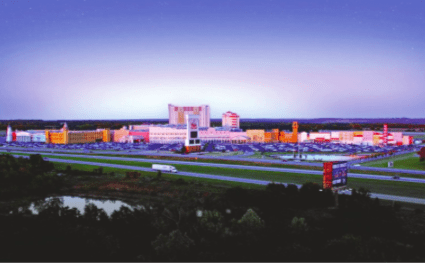
From supercomputers to chocolates, the Chickasaw are an object lesson in how tribes can create their own success.
Picture a peanut field in Thackerville, Oklahoma. A dirt road leads to a trailer home surrounded by small green plants emerging from the earth in this town about ten
miles north of the Texas border. Inside the trailer,patrons listen carefully as rows and numbers are called out, looking down at their mats after each turn.
“B6…C2….A12…”
“Bingo!” A woman shouts from the back of the room.
She’s gotten lucky. Back then, little did she or anyone else know that in this very spot would sprout thousands of games with thousands of people flocking to a former peanut field in hopes of feeling that same adrenaline rush. Today the peanuts are gone. And the stakes are higher.
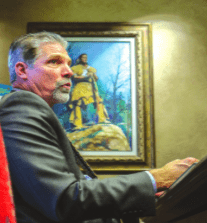
for the tribe’s Department of Commerce, said the tribe’s economic growth has been “remarkable.”
PHOTO BY CHI KALU.
Picture a casino, one of the largest in the world. It has over 500,000 square feet of gaming area alone, over 7,400 electronic games and 96 tables, upscale restaurants, three hotel towers, off-track betting on horse races and of course, bingo. This is the Winstar World Casino Resort, by certain measures the largest casino in the world.
This mighty money machine is owned and operated by the 60,000 strong Chickasaw Nation, a self-proclaimed “unconquerable” tribe once removed from Mississippi under pressure from President Andrew Jackson and subjected to decades of brutal poverty and discrimination, only to emerge as one of the great economic powers in the state of Oklahoma.
The Chickasaw Nation has its hand in over 60 business ventures, its lucrative casinos being just one of the diverse economic forces that drive the tribe and allow it to provide for its own healthcare, education, youth and elders.
The tribe is involved in everything from high tech medicine out in California to its very own chocolate production factory, Bedre, which produces world class chocolates in rural Davis, Oklahoma, just off OK-7.
It recently acquired Corvid Technologies in North Carolina, an engineering company that uses supercomputers to run simulated missile tests for the Department of Defense. Among other things, it has been assessing the impact of missiles on armored vehicles. It has invested in a company that makes robotic exoskeleton suits that will help the wheelchair-bound to walk as part of their physical therapy. The same technology is being used to help soldiers lift heavy loads.
Besides its 21 gaming facilities (everything from major casinos to convenience stores), the tribe has created LLC Gaming Solutions, a national consulting firm that advises other tribes on how to run their gambling operations.
It bought the Remington racino, a horse racing track in Oklahoma City, out of bankruptcy and has used it to help revitalize Oklahoma’s horse racing industry. Its Bank2 has accounts in nearly every state and executes more home loans for Native Americans than any bank in the United States. It is adding a 60,000 square foot convention center. Instead of
the Bureau of Indian Affairs doing things for the tribe, the tribe takes the federal money and runs its own programs and facilities its own way. And it’s working.
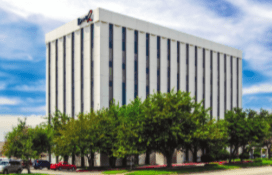
of the tribe’s successful business diversification efforts.
The tribe’s net income is over $400 million a year. The Chickasaw contribution to Oklahoma’s economy is about $2.4 billion a year, according to a study by Oklahoma City University. And then there are all those jobs – more than 13,000 of them – providing better lives for Chickasaws and non-Chickasaws alike.
Just a few decades removed from poverty, the Chickasaw people have good jobs. For the most part, their facilities are brand new, well-designed, shining examples to the rest of the Native American community of what to build and how to build it. Their medical center, a $176 million campus that’s aesthetically more akin to a luxury 5-star hotel than a hospital, sees patients of Native American blood and heritage without the patients ever having to see a bill.
The Chickasaw Nation has undergone sweeping changes since the 1980s, when tribal government asserted more control over its own destiny. It began to focus most of its efforts on building an economically diverse base to generate revenue that could, in turn, be used to support an impressive array of services to the Chickasaw people.
“I love change. I’m a change agent,” Pat Neeley, the undersecretary for business affairs at the Chickasaw Department of Commerce, said. “Every day my feet hit the floor in the morning and I know exactly why I’m getting out of bed and why I’m doing what I’m doing.”
Neeley may not be a Chickasaw, but he is visibly excited by what’s happening here in his new home.
“Our mission is alive,” Neeley said. “It’s vibrant. It’s something you can attach to. Whether you’re in commerce, or education, or arts and humanities, or a housekeeper at Winstar, everybody plays a very significant role in us fulfilling our mission, which is to enhance the overall quality of life of the Chickasaw people.”
As he watches the change all around him and measures its impact, Neeley said he couldn’t feel more Chickasaw. At least he doesn’t think he could.
The financial resurgence of the Chickasaw nation is staggering.

“It was 20 years ago or less that the Department of Commerce had barely 300 employees,” Neeley said. “Today, we have over 7,500 employees. That’s in two decades, which is remarkable. Overall, the nation employs 13,500 people, plus or minus. And 9,500 of those people are directly involved in Department of Commerce or economic development activities.”
Neeley is quick to credit a lot of this drastic change and economic improvement to the leadership of Governor Bill Anoatubby, who became the tribe’s lieutenant governor in 1979 and was elected governor in 1987.
“(Gov. Anoatubby) will be the first to tell you it was because of the people around him. He’s a very humble man,” Neeley said. “But it was his vision, his commitment that
planted the seeds that have been bearing fruit, significant fruit, for the last two decades. There’s not many leaders that get to see that.”
Neeley said that in a strictly financial context, the Chickasaw Nation has grown by more than 2200 percent since Anoatubby took over. With numbers like that, it’s no wonder he is serving an almost unprecedented eighth consecutive four-year term.
The tribe doesn’t just take care of its own. Anoatubby has been careful to be a good citizen to the state of Oklahoma as well, generously contributing to local charities and helping fund state and local road and bridge projects. Recently, when plans to build a major Native American museum in Oklahoma City fell through and local officials sounded an urgent call for help, the tribe stepped in to rescue the project with promises of cash and other assistance.
Remember that study that showed the tribe’s economic impact on this relatively poor state?

Evidence abounds of its good neighbor policy in towns like Sulphur, where the tribe’s mammoth cultural center draws tourists. It’s also where the tribe began its very first business, the humble Chickasaw Motor Lodge. The tribe replaced it with the 5-star boutique Artesian Hotel. It offers 81 rooms and a casino, but perhaps just as importantly, it has been a catalyst for growth downtown. That sort of neighborliness, that sort of philanthropy has gone a long way toward erasing the old attitudes some Oklahomans once held about Native Americans.
The transition the Chickasaw have made is one they had to make. The Chickasaw didn’t choose to move to this land, but they’ve made it their home and turned it into something that
is nothing short of remarkable. They are one of the greatest minority success stories in American history.
Oklahoma is almost nothing like the North Mississippi homeland still revered by the Chickasaw. Strange as it may seem, the trees are what some of the Chickasaw miss the most. One can drive through the rolling North Mississippi hills and see beautiful, large oak trees, their trunks wide and branches spreading relentlessly outward and upward. The trees of Mississippi stand tall and majestic, much like the Chickasaw did when they lived here.
But as the drive crosses the Mississippi River and penetrates further and further westward, the trees change. They become shorter, the trunks aren’t as wide and jagged branches shoot in every direction. It’s something many might not notice, but to the Chickasaw, the first glimpse of a large Mississippi tree brings back an emotional tie to their homeland.
“Man, look how big these trees are. This is our homeland,” David Correll, the tribe’s greenhouse supervisor remarked in April on a stop at the heavily wooded Chickasaw Preserve in Tupelo, part of a homeland tour, something the tribe offers a few times a year to help cement its connection to its roots. Heritage means a lot to these people and economic success has only increased that.
The Chickasaw Cultural Center, located in Sulphur, takes visitors back to a time when the Chickasaws were a dominant tribe in the Southeast, masters of trade and skilled warriors alike.
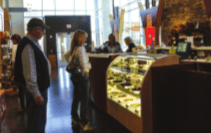
After 20 years of meticulously planning the center, it is now a “cultural home” for the Chickasaw people. It features a dazzling array of interactive exhibits, walkthroughs, natural-looking architecture using wood and large stone, and a replica village complete with a large Native American mound, stickball field, displays of traditional crafts, thatched-roof huts and one large meeting house.
The caliber of the cultural center is Smithsonian-worthy. The tribe has carefully seen to every detail. In fact, most Chickasaw facilities display impressive architecture and quality construction, part of the tribe’s effort to provide the highest quality of life for its people. Talk to the people who work in these buildings and you detect a consistent mindset that things are better and will continue to get better.
The tribe even has two innovative, imaginative early childhood development centers in Ada and Ardmore that seem like something out of a young child’s dream. Children enter through a small slide instead of a door. Inside, the school is modeled after a small town. The walls are painted in artwork designed to make classrooms look like fire stations or city halls. The cafeteria is a diner, complete with mini-leather booths where children can eat. Downstairs, Chickasaw and non-Chickasaw alike can be found taking a martial arts lesson, counting their kicks in the ancient language.
“Chaffa!”
“Toklo!”
“Tochchi’na!” they shout as they extend their kicks off of the red and blue mats covering the floor.
This kind of school is just one of many examples of how the Chickasaw Nation is able to take care of its people through every stage of life, from developing their youth to taking care of their sick or elderly in new, advanced medical facilities.
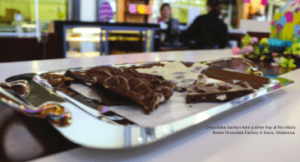
All of this, of course, would not be possible without the tribe’s economic success.
The tribe generates about $1.4 billion in total business revenues. Gaming accounts for about 90 percent, according to that Oklahoma City University study. But what’s more impressive is how this money is utilized. Much of it is put directly back into tribal development and services to Chickasaws as well as bettering the lives of all Oklahomans.
“We’re Oklahomans, too,” Neeley said. “We live and work in the same communities. It’s important that we all understand the impact that we’re having in terms of job creation or economic growth or production of goods and services.”
In the 1960s it would have been impossible to imagine that the tribe would one day be able to bail out its neighbors. After all, the government had broken treaties and dissolved reservations and tribes as part of an ill-fated attempt to force Native Americans to assimilate into the mainstream culture. The result was predictable. Depression. Poverty. Resentment. Things looked awfully bleak.
Come to think of it, perhaps that peanut field in Thackerville might just be the perfect symbol for the Phoenix-like rise of a tribe that once seemed to have no future at all.
By Will Crockett
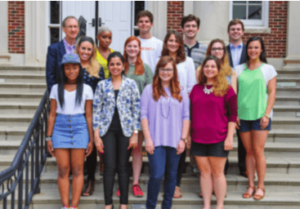
THIRD ROW: Bill Rose, Chi Kalu, Slade Rand, Mitchell Dowden, Will Crockett. Not pictured: Tori Hosey PHOTO BY THOMAS GRANING
The Meek School faculty and students published “Unconquered and Unconquerable” online on August 19, 2016, to tell stories of the people and culture of the Chickasaw. The publication is the result of Bill Rose’s depth reporting class taught in the spring. Emily Bowen-Moore, Instructor of Media Design, designed the magazine.
“The reason we did this was because we discovered that many of them had no clue about the rich Indian history of Mississippi,” said Rose. “It was an eye-opening experience for the students. They found out a lot of stuff that Mississippians will be surprised about.”
Print copies will be available October 2016.
For questions, email us at hottytoddynews@gmail.com.
Follow HottyToddy.com on Instagram, Twitter and Snapchat @hottytoddynews. Like its Facebook page: If You Love Oxford and Ole Miss…
